OpenAI Dev Day 2025: What Just Changed in AI
Sam Altman just dropped four game-changing announcements at Dev Day. Here's what happened, what it means for AI, and why this changes everything for developers and businesses.
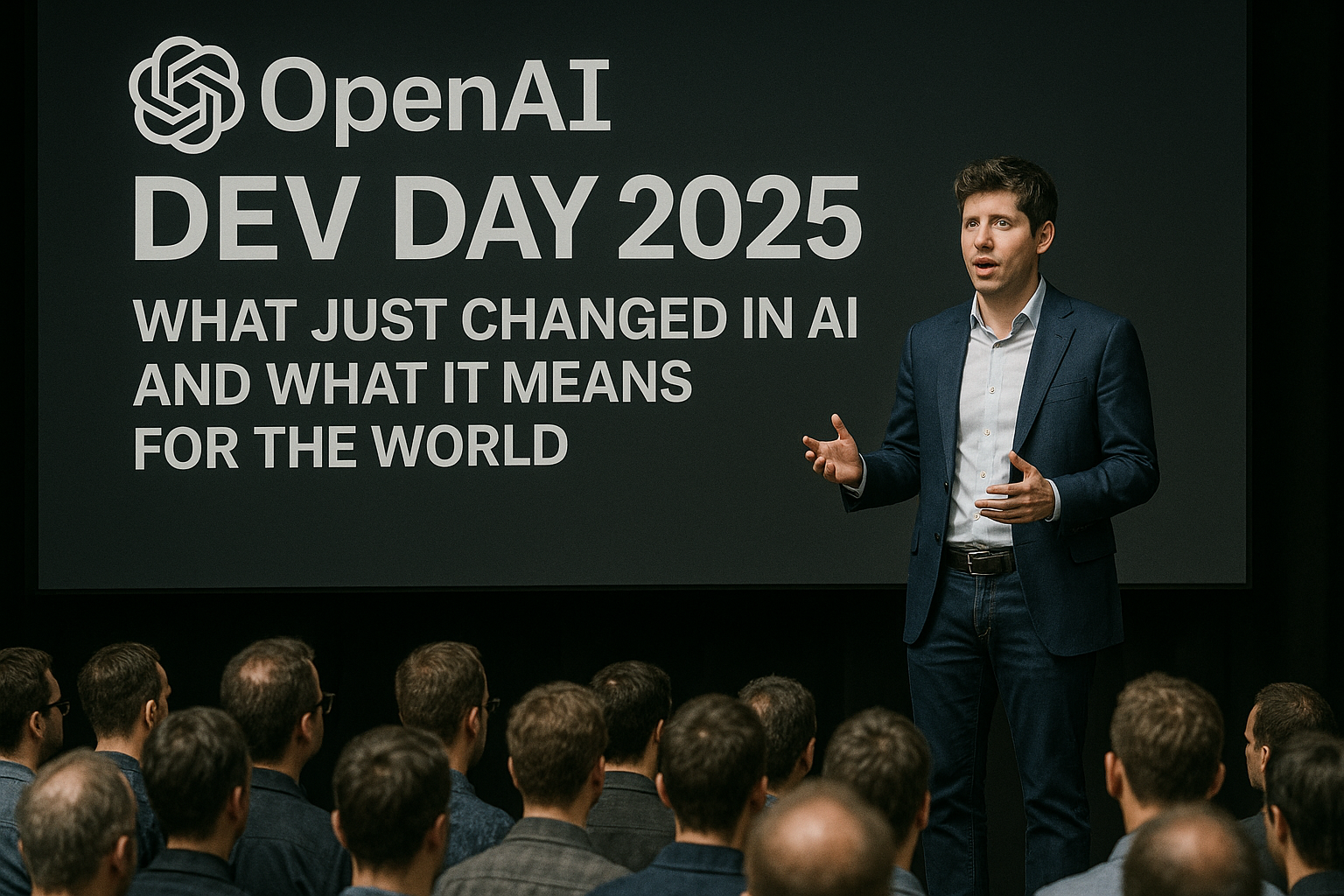
A few hours ago, Sam Altman took the stage at Fort Mason in San Francisco and announced what might be the biggest shift in AI development we've seen in years. If you weren't watching the livestream, here's what you missed—and why it matters.
The Four Big Announcements
Sam Altman structured today's Dev Day around four major themes:
Let's break down each one and what it actually means.
1. Apps Inside ChatGPT: The New App Store Moment
What Happened
OpenAI just opened up ChatGPT for developers to build interactive apps inside conversations. Not just chatbots. Full applications. With UI, data, actions—everything.
They launched a brand new Apps SDK (in preview, available today) that gives you:
How It Works
The demo showed live integrations with:
Coursera - "Coursera, teach me about machine learning"
→ The app loads inline with video playback, and you can ask ChatGPT questions about what's happening in the video while watching
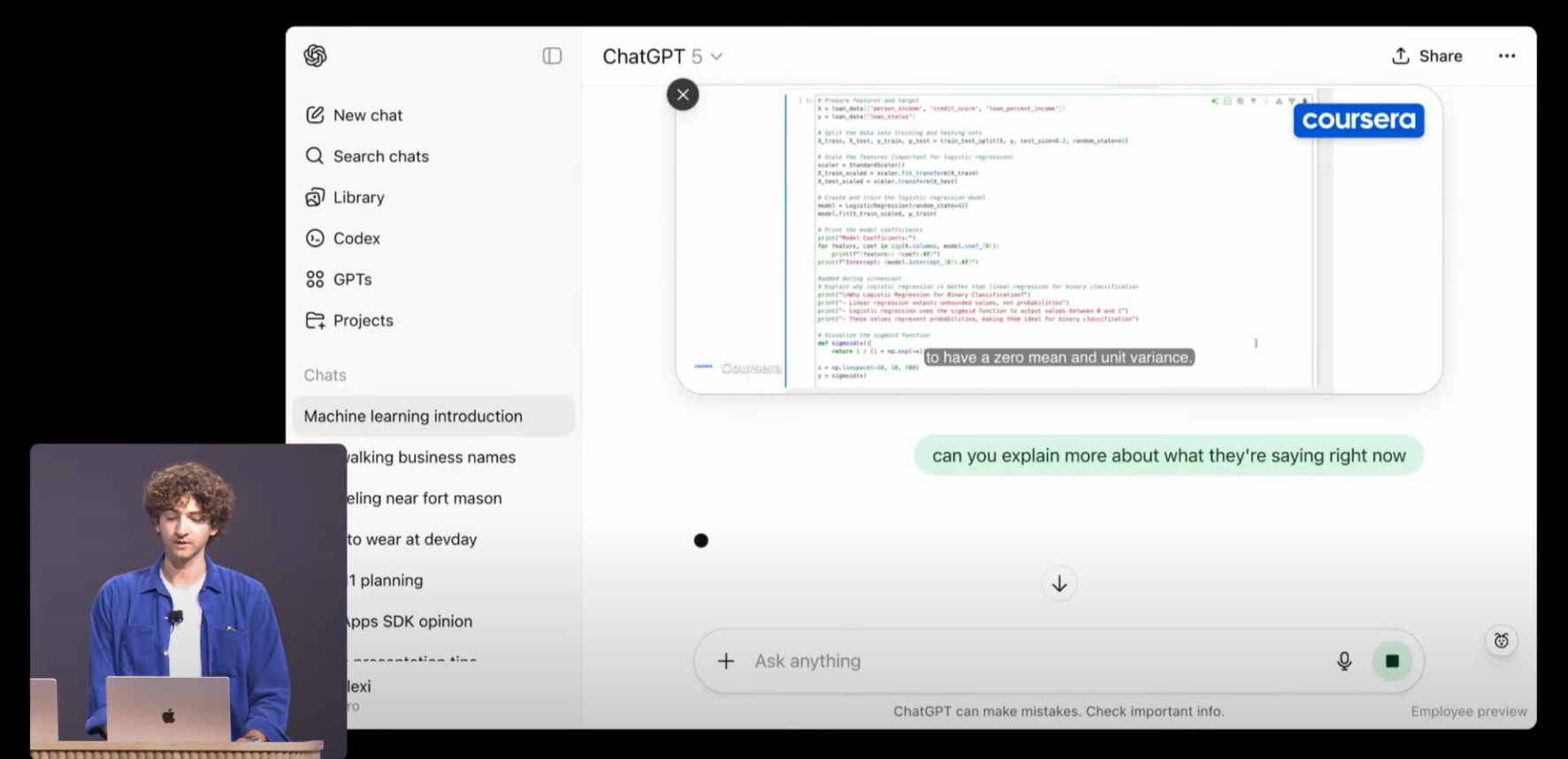
Canva - "Canva, turn this into a pitch deck"
→ Creates a full slide deck right inside the conversation, editable on the fly
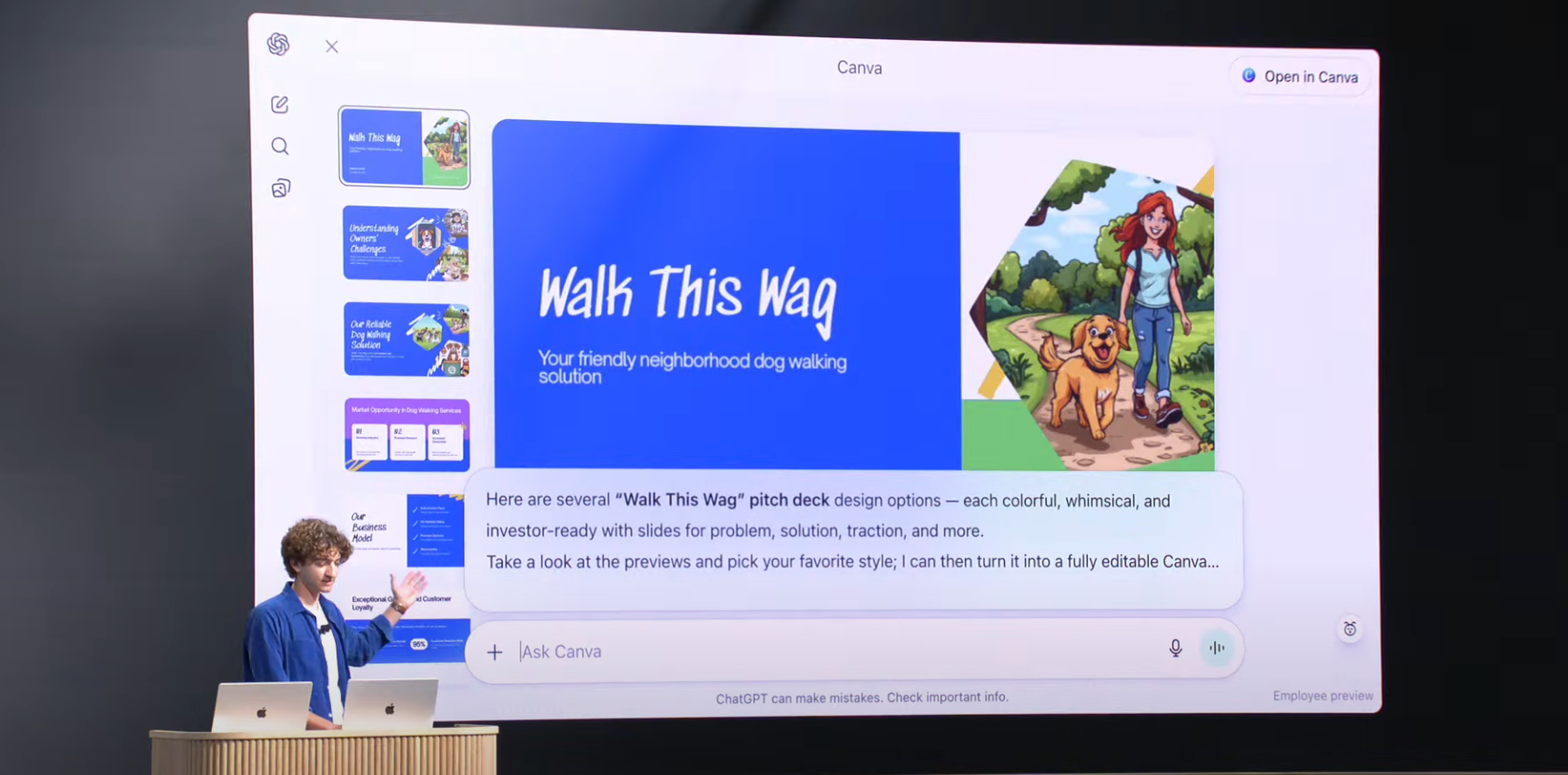
Zillow - "Show me homes for sale in Pittsburgh"
→ Interactive map with listings, filtering, and direct actions—all inside ChatGPT
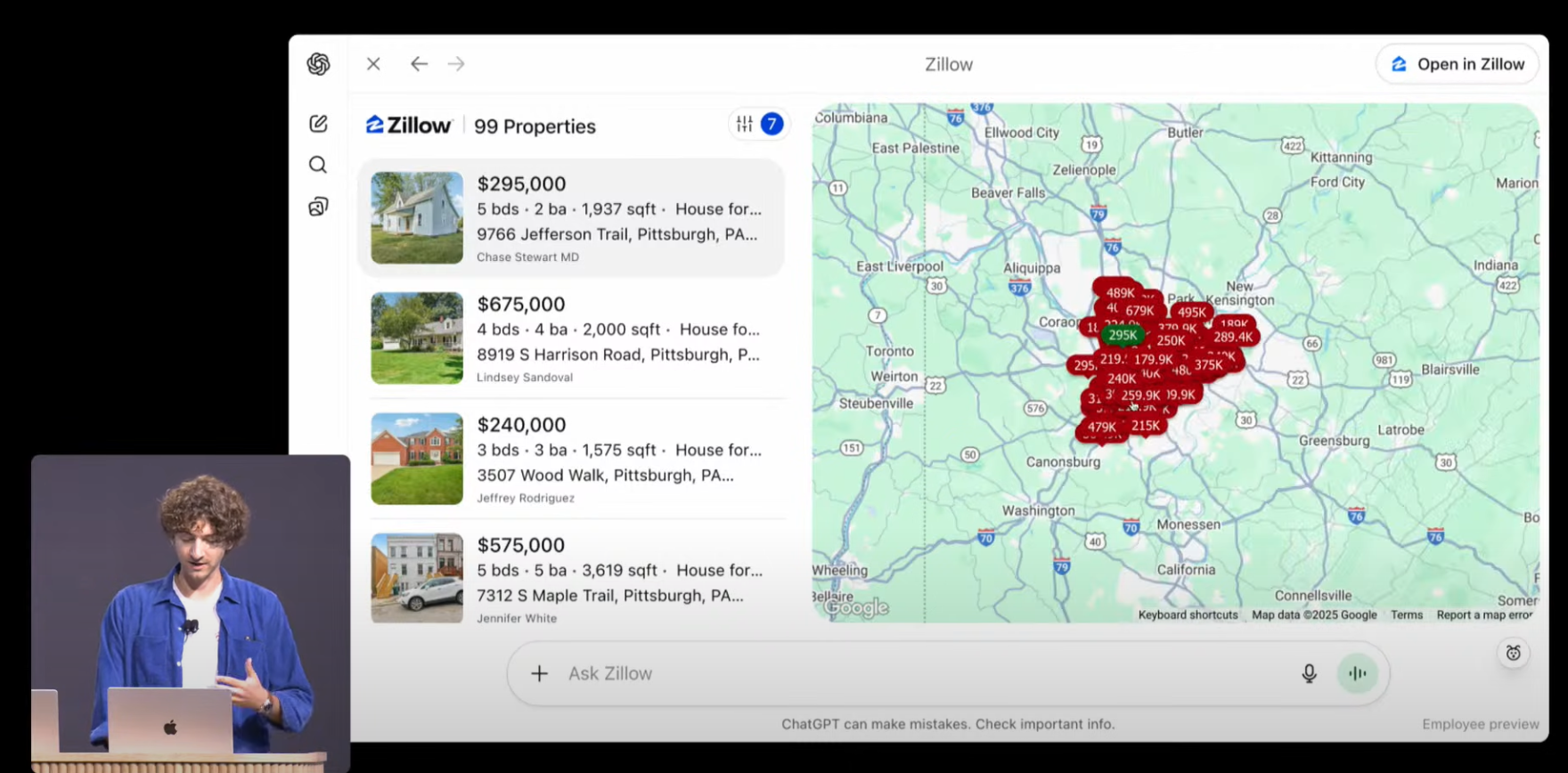
The magic? ChatGPT can "talk to your apps" through context APIs. It knows what the user is looking at and can answer questions about it in real-time.
What This Means for the World
This is OpenAI's play for distribution. They're creating a new platform—like the iOS App Store or Chrome Web Store—but powered by natural language.
Think about it:
For developers: This is a massive opportunity. You can reach hundreds of millions of users instantly. If a user already subscribes to your product, they can log in from the conversation. No friction.
For businesses: Your SaaS product can now be discovered through conversation. Someone asks ChatGPT a question, and your app gets suggested if it's relevant.
For users: Software just got 10x easier to use. You talk, apps appear, things get done.
Developer Guidelines are published today, apps can be submitted for review later this year, and a browsable directory is coming.
2. AgentKit: From Idea to Production Agent in Minutes
What Happened
Building AI agents is hard. You need orchestration, eval loops, tool connections, UI—and most agents never make it to production.
OpenAI just solved this with AgentKit: a complete set of building blocks to take agents from prototype to production, fast.
AgentKit includes:
1. Agent Builder
Visual workflow designer. Drag and drop nodes (tools, logic, guardrails, human-in-the-loop). Test flows. Ship ideas. No code required to start.
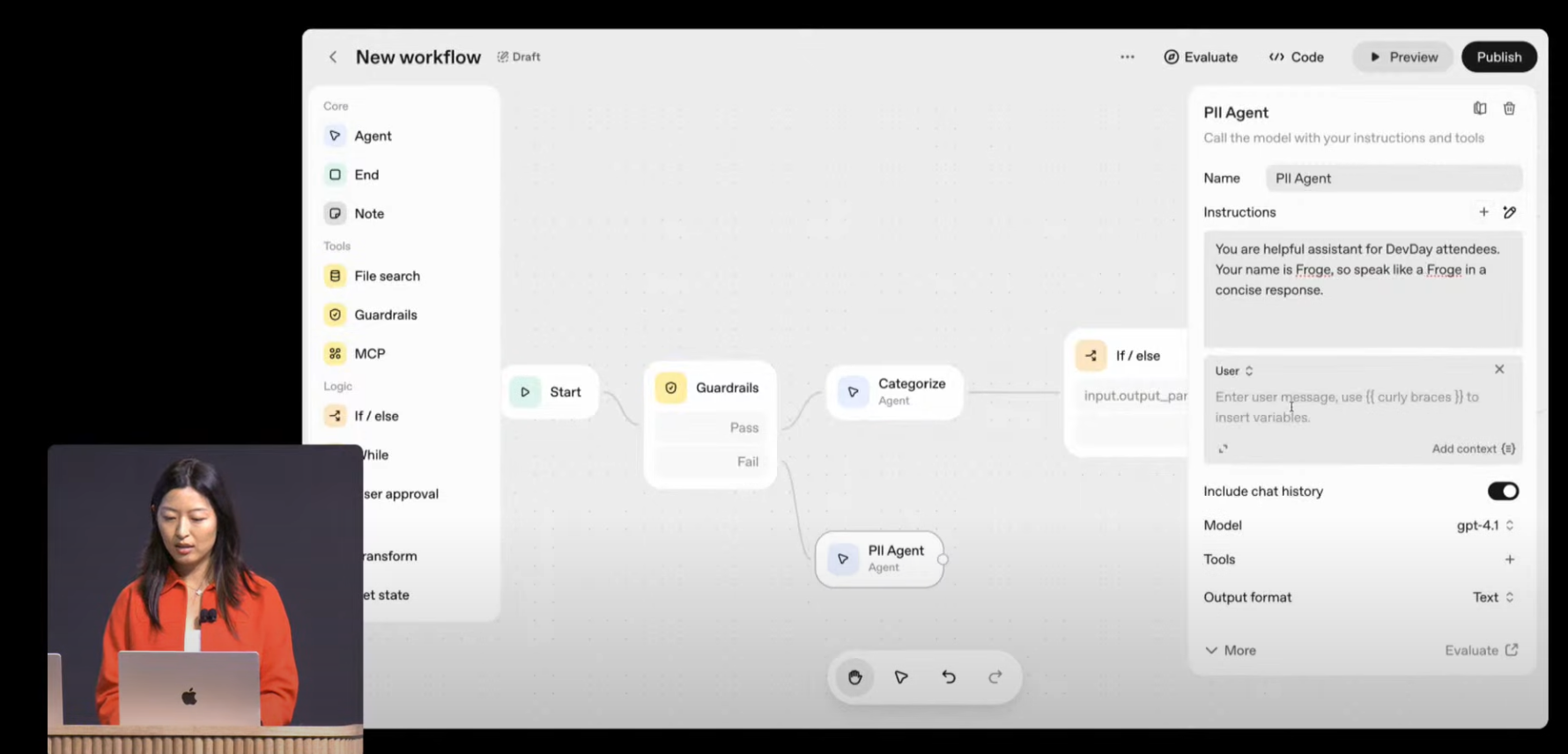
2. ChatKit
Embeddable chat interface for your apps. Fully customizable with your brand. Works across all agent nodes.
3. Evals for Agents
4. Connector Registry
Securely connect agents to internal tools and third-party systems through an admin panel.
The Demo That Blew My Mind
Christina from the OpenAI team built and deployed a fully functional AI agent in 8 minutes live on stage. Here's what she did:
The agent could answer questions like "What session should I attend to learn about agents?" by searching through files, using custom widgets to display info, and speaking in Froge's style (with ribbits).
What This Means
For developers: You can now build production-grade agents in hours instead of months. No more wrestling with frameworks, orchestration layers, or eval pipelines.
For enterprises: Deploy AI agents across your organization with confidence. Admin controls, security, monitoring—it's all built-in.
For the world: We're about to see an explosion of AI agents solving real problems. The barrier to entry just dropped to near-zero.
3. Codex: AI That Writes Your Software
What Happened
Codex, OpenAI's software engineering agent, just went GA (generally available) after months in research preview.
It now runs on GPT-5-Codex, a version of GPT-5 specifically trained for agentic coding. This model is better at:
Codex works everywhere:
Your ChatGPT account connects it all.
The Demo That Felt Like Magic
Romain from OpenAI took the stage and built a live camera control system for the Dev Day venue using Codex. In real-time. On stage.
Here's what happened:
Example conversation with the AI:
> "What do you see on camera?"
> "I see a large audience in front of you with rows of attendees seated and ready."
>
> "Could you shine the lights towards the audience?"
> "I've just lit up the audience with a nice bright light."
>
> "Can you greet everyone here?"
> "Hello, amazing developers at Fort Mason!"
Then, the finale: Romain asked the voice agent to ask Codex (using the Codex SDK) to add a movie-style credits overlay for the attendees—and it did it. In real-time. While the presentation was running.
What This Means
Software development just changed forever.
You can now:
For individual developers: You're now 10x more productive.
For startups: You can build and ship products at unprecedented speed.
For enterprises: (Like Cisco) You can cut project timelines from weeks to days.
An 89-year-old retiree in Japan taught himself to code with ChatGPT and built 11 iPhone apps for elderly users. Medical students at ASU built a virtual patient app to practice difficult conversations. Versailles Palace visitors can now talk to art and sculptures using OpenAI's Realtime API.
The only limit is imagination.
4. Model Updates: More Power, More Modalities
OpenAI also released GPT-5 Pro in the API (their most intelligent model for finance, legal, and healthcare applications) and GPT-Realtime-Mini (70% cheaper voice AI with the same quality). Most exciting for creators: Sora 2 video generation is now available in the API—turn sketches into fully rendered video concepts, generate product ads, and add synchronized soundscapes. As Sam Altman predicted: "Voice is going to become one of the primary ways people interact with AI."
What This All Means for the World of AI
1. The Acceleration Is Real
Software that used to take months or years now takes minutes. We just watched someone build a production-ready agent in 8 minutes and a camera control system in 20 minutes.
The idea-to-product timeline has collapsed.
2. AI Has Gone From "Ask" to "Do"
We're past the chatbot era. AI now:
This is agentic AI—and it's here.
3. Distribution Just Changed
The new platform wars are starting. OpenAI is positioning ChatGPT as the platform where apps live and get discovered. 800 million weekly users is bigger than most app stores.
Developers who build on this platform early will have a massive advantage.
4. Coding Is Now Natural Language
You don't need to learn protocols, frameworks, or complex systems anymore. You describe what you want. AI figures out how to build it.
This democratizes software creation in a way we've never seen. Anyone with an idea can build.
5. Agents Are Going Mainstream
With AgentKit, the barrier to building production agents just dropped to near-zero. Expect to see:
The Bottom Line
As Sam Altman said: "This is the best time in history to be a builder. It has never been faster to go from idea to product."
He's right.
The only question now is: What are you going to build?
At Arkhai Technologies, we're already integrating these new capabilities into solutions for Indian businesses. Want to explore how AI agents, Codex, or the Apps SDK can transform your workflow? Let's talk.
Tarunn Bhende
Co-Founder, Arkhai Technologies
Building AI solutions for the next generation of businesses
Related Articles

The Future of AI in Healthcare: Building TheraSynth
How we built an AI therapist that understands human emotion and provides personalized mental health support 24/7.
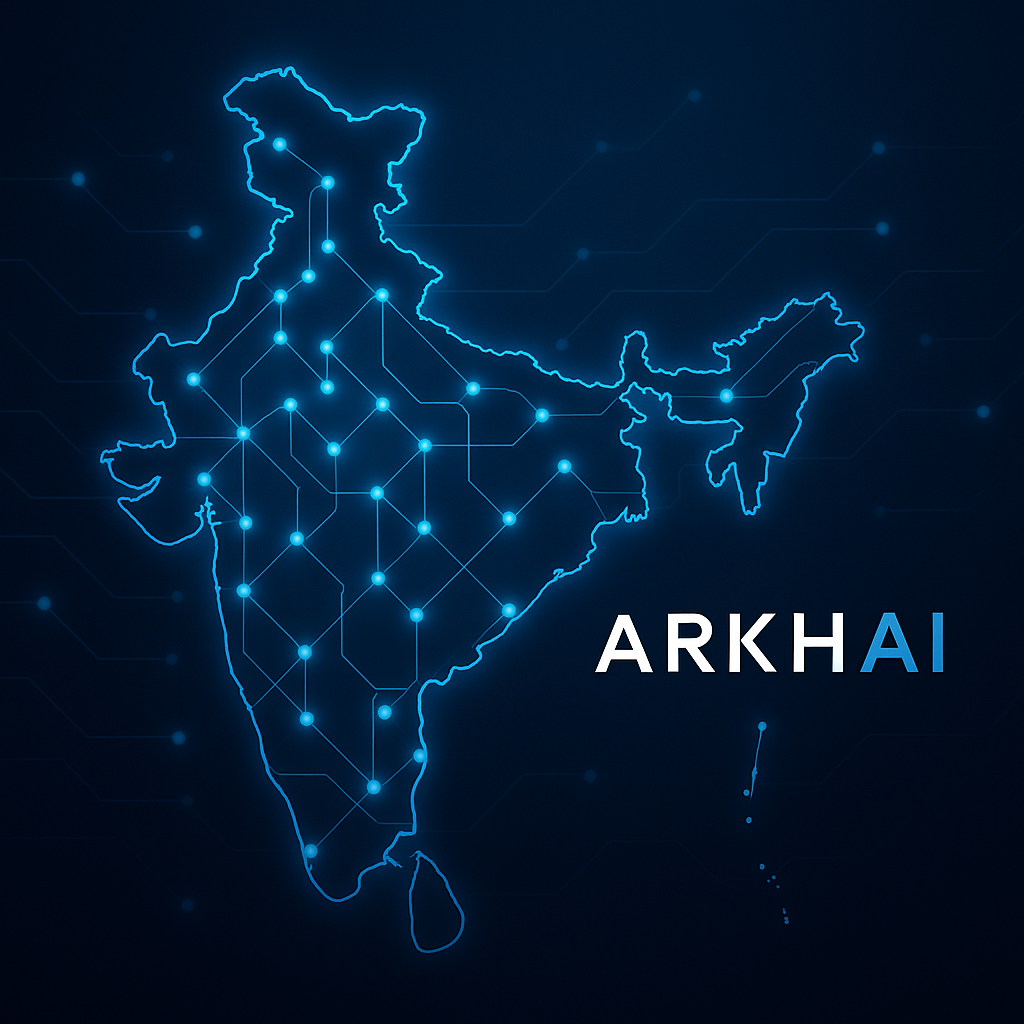
How Arkhai is Bringing OpenAI's Agent Revolution to Indian Businesses
OpenAI just made AI agents 10x easier to build. Here's how we're integrating AgentKit, Codex, and the Apps SDK into niche workflows for businesses across India.

Dexter: Revolutionizing College Counseling with AI
How AI is transforming the college application process and making higher education guidance accessible to every student.